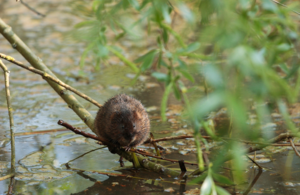Boost for rare and threatened species with new conservation funding announced
It will be used to create solutions to address species decline in England, research and to invest in wildlife habitat restoration and creation.

The grant scheme will help safeguard rare and threatened species from extinction.
A new multi-million pound grant scheme was launched today (Monday 3rd April) by Natural England to help safeguard rare and threatened species from extinction.
Species such as lady’s slipper orchid, water vole, natterjack toad, wartbiter cricket and curlew could benefit from a grant from the £18 million Species Recovery Programme Capital Grant Scheme.
The scheme will support projects over two years delivering targeted conservation action through the creation and improvement of specific wildlife habitats, conservation translocations - whereby native at-risk species are moved or released from one geographic area to another to boost populations - as well as supporting research and creating solutions to address species decline.
Tony Juniper, Chair of Natural England, said:
England’s wildlife is subject to a range of pressures with many species seeing drastic decline. The fragmentation of habitats, historic losses of natural areas, pollution, the changing climate and the impact of invasive alien species have all played their part, to the point today where nearly 40 per cent of England’s wildlife species are in decline and about 15 per cent in danger of becoming extinct here.
We know that we can turn this around though. The return of large blue butterfly to flower-rich grasslands in the Cotswolds, red kites coming back to soar over the Chiltern Hills and beyond, the bittern making a comeback back in East Anglian wetlands and the white-tailed eagle to the South Coast all present practical cases in point as to what we can be done with careful planning and partnership working. The funding announced today will continue to build and support the excellent collaborative work that is happening as we work to put Nature on the road to recovery.
Grants will be available for environmental charities, local authorities, protected landscapes, scientific institutions and others to improve the prospects, rebuild populations of vulnerable species and improve targeted habitats for nature across England.
The fund supports the Government’s commitment to halt nature’s decline by reducing the risk of species extinction by 2042, and supports the creation of a Nature Recovery Network of wildlife rich habitat that allows nature to thrive and people to benefit.
The new scheme is part of Natural England’s Species Recovery Programme (SRP), which has helped improve the conservation status of England’s priority and threatened species since the 1990s. Previous notable successes have included:
-
A targeted recovery effort for bittern, involving the restoration and creation of extensive reedbeds. Over a 20-year period, the bittern population has increased from 11 booming males to over 200 now, more than have occurred in England for over 200 years.
-
The recovery of the fen raft spider. Known in only three sites in the UK, recovery action began in 1991, first tackling water levels and quality, and then on reintroductions of the species at former sites using captive breeding.
Natural England encourages applications from today (3 April 2023) that focus on the recovery of England’s most at-risk species across land, freshwaters and seas. Further details of the grant scheme, including how to apply, can be found on the Natural England blog.
Further information:
-
Applications will be made through the Atamis platform. Applicants must register to the Atamis platform before an application can be made. For further information and application see the Atamis landing page:
-
Welcome (force.com) The SRPCGS can be searched for using the ‘Find Opportunities’ page and searching using either the title - Species Recovery Programme, or the code C5132